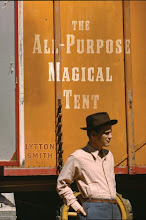
(photo from Tom Orange's Flickr)
In the Class of 1944 Hall there is a Black Box Theater. On Wednesday 11th June it was fairly empty. Around midnight, some people with language written down gathered and they read that language while other people listened. Most of you missed it, but that's okay - those who were there will read again.
The next night, 11pm, same Black Box, but this time with a grand piano, silent and unacknowledged, in the back of the room. Hardly anyone mentioned it, this citation of the San Francisco Grand Piano reading series, this quiet joke, this recreation of...what? atmosphere? scene? the setting for when the famous poet I forget began to play music through/in accompaniment to/despite the other famous poet's reading but was silenced? And what is a famous poet anyway?
The occasion was the group Grand Piano reading, featuring three of the ten people engaged in a collective autobiography effort to chronicle, engage, and even revise, the period between 1975-80 the way a part of San Fransisco experienced American and the ending of an in any case arbitrary decade.
"Instead of 'ant wort' I saw 'brat guts'" records and explains Bob Perelman, Barrett Watten's way of explaing the "Brat Guts" reading process (in The Constructivist Moment ) by which members of a group produce writing in response to the reading aloud of writing by other members of the group. This process was performed on 6/12/08 in that Black Box, backed by that piano, which was not but could in any case have been the piano against (or at first towards) which these 3 readers (Steve Benson, Kit Robinson, Barrett Watten) read, as did the other 7 writers of the collective autobiography project (some at the conference but not part of this group moment, audienced rather than reading/writing; some absent from the conference), as did dozens of other writers, some almost never mentioned with the so-called Language poets too easily and too erroneously grouped together (Philip Lopate, for instance, read in the series).
What the reading performed, then, in its method and in its visual props, was a layering of (competing) experiences, (competing) symbols of experienced, and (competing) articulations of experience. Readings overlapped, so one had to tune out one of the two, or let the mixture work. Readers read from 5-6 source texts in addition to the issue of the Grand Piano from which they were ostensibly reading. All the while, readers were writing, but not (at least as far I could see) reading what they were writing (experienced left unarticulated for now, experience of what). Lines were shared but, identical in the letters and ordering of letters that comprised them, they were not identical in the different uttered iterations.
I'm writing about the Grand Piano group reading not because I enjoyed it, or was there, or found it a new experience, a different type of reading. The event - as Ron Silliman titled his post today, "Writing as Event," a familiar but needfully repeatable phrase, worth further thought - is itself layered within a group experience of the "Poetry of the 1970s" conference which includes the experience of those there, of those not there but in some way a participant in the decade (there at the time, reading of it later, etc), and all the differences that encompassed.
Indeed, one tension at the conference, hopefully headed in a productive direction, is between the New Sentence theorists (at times equated, too simplistically, with the so-called Language poets) and the New Narrative theorists (at times equated, too simplistically, with anti-Language poetry, with minority poets of various definitions or anti-definitions). There's not space now to write in a nuanced enough way about this debate, save to say that the New Narrative panel offered some interesting and vital glimpses onto the blurred quality of group identity, as well as the danger of seeing the 1970s in relation to a Language school of poets which is, for whatever reasons and with whatever validity, at odds with itself and often denies its own existence).
The process as well as the content of the Grand Piano group reading thus stands as part of a greater engagement with not just the Poetry of the 1970s but the articulation of group experience in ways that allow for difference without essentializing it. A record of an event can be always in revision because writing is itself event; the need for a record to be revisable, and not monolithic, does not preclude works of record and chronicle providing those works recognize and encode their own status as process.

4 comments:
quick comment, (and apologies if I'm off the mark after a very quick read) as on my way out the door of the Rare Books room, but I want to extend your last comment more explicitly, because by making a record revisable, you're also making it revisitable, opening it to being meaningful whether or not its initial present included the visitor's presence.
Too many italics! Forgive me.
Interesting comment, especially coming from a visit to the rare books room - a meeting of visitors, the present, and presence if ever there were one!
I really love the sound coming from the piano. Every time that i listen this rhythm i feel comfortable and i can improve my mood. I like to read useful information too, so this blog is amazing. I must to say that i found another one,that i considered interesting too, called costa rica investment opportunities i invite you to visit it.
I am sure it puts off a beautiful noise.
Post a Comment